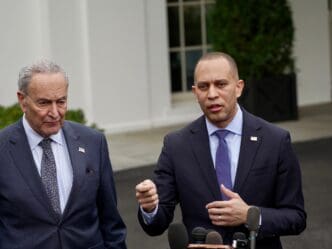Executive Summary
The Story So Far
Why This Matters
Who Thinks What?
The federal government shutdown has entered its 21st day, making it the second-longest in U.S. history and nearing the 35-day record set during the first Trump administration. As the standoff continues, Democrats appear to be winning the political “blame game,” despite initiating the shutdown with a policy demand for extending enhanced Obamacare subsidies.
Blame Game Dynamics
President Trump recently asserted that Democrats were “getting killed in the polls” and that the public understood their actions were “the wrong thing.” However, this claim is not supported by recent public opinion surveys.
Polling data consistently indicates that Trump and congressional Republicans are shouldering more blame for the shutdown than Democrats. A Reuters-Ipsos poll conducted from October 15-20 found Americans blamed congressional Republicans over Democrats by a margin of 50% to 43%.
Similarly, a CNBC poll from October 8-12 showed 53% of Americans blaming Trump and Republicans, compared to 37% who blamed Democrats. Notably, independent voters placed blame on Trump by a nearly 3-to-1 margin (58%-21%).
Historical Context and Policy Popularity
This dynamic marks a departure from previous prolonged shutdowns, such as those in 1995-96 and 2018-19, where the party making the policy demand typically suffered politically. In those instances, the blame for the shutdown consistently fell on the Republican Party, and their poll numbers worsened as the standoffs progressed.
A key factor in the current situation appears to be the popularity of the Democrats’ core demand. The Reuters-Ipsos poll revealed that 72% of Americans, including 51% of Republicans, support extending health care subsidies, a position that has remained consistent across recent surveys.
Looming Deadlines and Strategic Considerations
The shutdown’s impacts are beginning to intensify, with federal employees expected to miss their first full paycheck this week. Additionally, small business loans are being held up, and aid programs like food stamps could soon face interruptions.
A critical deadline for Democrats’ policy objective is November 1, when open enrollment for Obamacare plans begins. Without the extended subsidies, many Americans could see their premiums significantly increase, in some cases doubling, according to the nonpartisan health policy research organization KFF.
For Democrats, the current polling suggests a strategic opportunity to hold out, with some Republicans, including Rep. Marjorie Taylor Greene and even Trump’s own pollster, reportedly expressing concerns about the political cost of allowing premium hikes. This could present a significant political win for the party, which has seen few major legislative victories since the November election.
Furthermore, a concession from Democratic leadership, particularly when public opinion appears to favor their position, could risk alienating a base that has often called for a stronger stance from the party.
Outlook
As the shutdown continues, the interplay of public opinion, policy popularity, and looming deadlines is creating a more complex and potentially extended standoff compared to past government shutdowns. The coming days are expected to be pivotal in determining the path forward.








